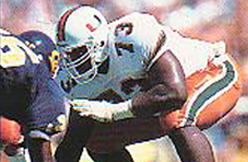Miami’s Leon Searcy watched ESPN’s 30 for 30 film “The U,” which chronicles the rise of Miami’s football dominance from 1983 to 1993. He puts on his movie reviewer hat to talk about what he thought of the documentary that he not only watched but also lived.
I loved the movie.
It gave a very descriptive detail of what the University of Miami was back in the 80s.
It looked at how the program grew to prominence in the Howard Schnellenberger era, the Jimmy Johnson and the Dennis Erickson eras. I think it was wonderfully done and showed the good, the bad and the ugly.
The whole movie fell into line of what the University of Miami was all in the early 80s all the way up to the early 90s. I mean I thought it was great. I thought it was Oscar-worthy but of course I would say that.
But this movie talked about everything. It looked at how Schnellenberger pretty much built the program up from ground zero. How he marketed the product and how he went after Miami Dade and Broward County athletes. How the four and five-star recruits like Michael Irvin, Alonzo Highsmith, Bennie and Brian Blades decided to stay in South Florida to build this program.
All those kids were recruited by so many different colleges but that was what turned Miami around, when the major recruits in the South Florida area decided not to go to other schools and beat up on each other. They decided to form right here and go to the University of Miami. They were near home, played some football, had their families see them play. And if they had some social unrest with their families, they didn’t have to go far to handle them.
And the documentary covers all of that. It also went into the transition from one era to another and how Jimmy Johnson took a bad rap from a lot of outside sources who were trying to get him to put a leash on the players. People thought we were too brash and too cocky and too confident.
Jimmy told them, “You don’t know these kids and you don’t know their upbringing. You don’t know what they go through. They’re using the football stage to express themselves.” All they saw was poverty, all they saw was dysfunction, and they used football as a means of expression. And the great thing about it is that Jimmy Johnson would not let outside sources stifle these kids.
All Jimmy Johnson asked was that if I go to bat for you, you go to bat for me. That’s why we won so many games. That’s why we were so brash. That’s why we won some titles, because we had Jimmy even standing up to the president of the university, which they show in the documentary.
Then you had testimony from former guys like Michael Irvin, Alonzo Highsmith, Brett Perriman, Bennie Blades, Jessie Armstead and me. I mean this movie has all the who’s who of the “U.” And most of the guys gave a pretty detailed description of what Miami was all about.
When I first heard someone was making this movie I thought “this was long overdue.” I mean, because a lot of people tend to forget that from 1983 to 1993, in that ten-year span, Miami had either directly or indirectly had something to do with the national title just about every year.
It talked about the Pell Grant scandal, it talked about 2 Live Crew. So they didn’t pull any punches. The one thing that I like about this documentary is that it didn’t pull any punches.
It was real about the story telling and guys were just pretty frank about what went on at Miami within that ten-year span.
For me the best part of the movie was all the winning. I was there for five years from 87-92; I mean we won a whole bunch of games. In my five years at Miami we were 56-4, including bowl games. So the highlights of the big plays during those years brought me back.
Seeing the Michal Irvin touchdown against Florida State that brought us back and won the game; seeing the wide right against Florida State that ultimately helped us win a national title and watching the Sugar Bowl when we beat Alabama for the national title. Those highlights were amazing. It was just great footage.
It was a great experience.
So to end my review, I’m going to channel my inner Roger Ebert:
First of all, it gets two thumbs up. An excellent movie. I would say the documentary is riveting, powerful, scary, and frightening and a testament to one of the most dominant football programs in college football history.
(lostlettermen.com)


